
The Korean War Service Medal, also known as the Republic of Korea War Service Medal (ROKWSM), is a military award of South Korea which was first authorized in December 1950.
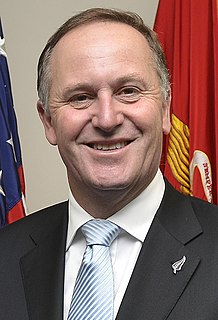
Sir John Phillip Key is a New Zealand retired politician who served as the 38th prime minister of New Zealand from 2008 to 2016 and as Leader of the New Zealand National Party from 2006 to 2016. After resigning from both posts in December 2016 and leaving politics, Key was appointed to board of director and chairmanship roles in New Zealand corporations.
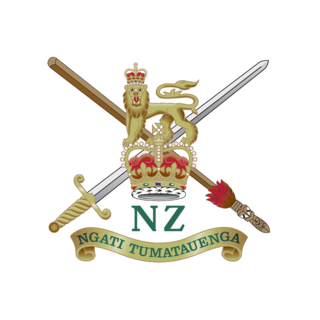
The New Zealand Army is the land component of the New Zealand Defence Force and comprises around 4,659 Regular Force personnel and 2,122 Reserve Force personnel. Formerly the New Zealand Military Forces, the current name was adopted by the New Zealand Army Act 1950. The New Zealand Army traces its history from settler militia raised in 1845.
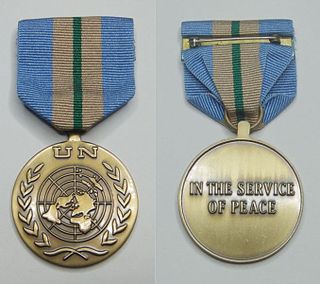
A United Nations Medal is an international decoration awarded by the United Nations (UN) to the various world countries members for participation in joint international military and police operations such as peacekeeping, humanitarian efforts, and disaster relief. The medal is ranked in militaries and police forces as a service medal. The United Nations awarded its first medal during the Korean War (1950–1953). Since 1955, many additional United Nations medals have been created and awarded for participation in various United Nations missions and actions around the world.
British campaign medals are awarded to members of the British Armed Forces, Allied forces and civilians participating in specified military campaigns. Examples include the Defence Medal, for homeland defence in World War II, and the Atlantic Star for World War II sea service in the Atlantic.

The International Force East Timor (INTERFET) was a multinational non-United Nations peacemaking task force, organised and led by Australia in accordance with United Nations resolutions to address the humanitarian and security crisis that took place in East Timor from 1999–2000 until the arrival of UN peacekeepers. INTERFET was commanded by an Australian military officer, Major General Peter Cosgrove.
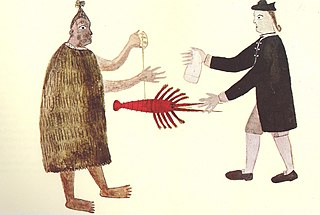
The military history of New Zealand is an aspect of the history of New Zealand that spans several hundred years. When first settled by Māori almost a millennium ago, there was much land and resources, but war began to break out as the country's carrying capacity was approached. Initially being fought with close range weapons of wood and stone, this continued on and off until Europeans arrived, bringing with them new weapons such as muskets. Colonisation by Britain led to the New Zealand Wars in the 19th century in which settler and imperial troops and their Māori allies fought against other Māori and a handful of Pākehā. In the first half of the 20th century, New Zealanders of all races fought alongside Britain in the Boer War and both World Wars. In the second half of the century and into this century the New Zealand Defence Force has provided token assistance to the United States in several conflicts. New Zealand has also contributed troops extensively to multilateral peacekeeping operations.
Prior to 1946 the New Zealand armed forces received honours of the United Kingdom, including military decorations and campaign medals. Since the end of World War 2 there have been constant moves towards an independent New Zealand honours system. This has resulted in a new system of New Zealand honours, gallantry and bravery awards, and campaign medals.
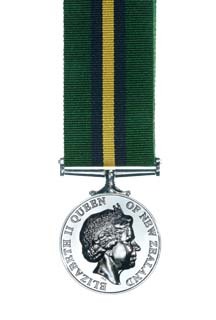
The New Zealand General Service Medal 2002 was a New Zealand campaign medal for service in the Solomon Islands. The medal was awarded for service during Operation Purple Haze 1 and 2, Operation Zephyr, and the International Peace Monitoring Team from 2000 to 2002 and with the Regional Assistance Mission to Solomon Islands (RAMSI) from 2003 to 2013.

The New Zealand General Service Medal 2002 was a New Zealand campaign medal for service in the Iraq.

The New Zealand General Service Medal 1992 (Non-Warlike) is a New Zealand campaign medal, authorised in 1992, for award to New Zealanders who have served in peacekeeping operations for which no separate UN medal was issued.
The National Army Museum is the museum of the New Zealand Army. It was formerly known as the Queen Elizabeth II Army Memorial Museum. It is located on State Highway One, on the southern side of the small military town of Waiouru. The 1300 square metre museum is fortress-looking in design, complete with a bridge and moat. It took the 2nd Field Squadron of the Royal New Zealand Engineers (RNZE) 276 days to build, and was opened in October 1978.

New Zealand–North Korea relations refers to international relations between New Zealand and North Korea. Relations between the two countries have been almost non-existent since the division of Korea. During the Korean War in the 1950s, New Zealand troops fought as part of the United Nations force that repelled the North Korean invasion of South Korea. Since then, New Zealand and North Korea have had little contact, until July 2000 when North Korean Foreign Minister Paek Nam-sun and New Zealand Minister of Foreign Affairs Phil Goff met in Bangkok, leading to the establishment of diplomatic relations in March 2001. The New Zealand ambassador to South Korea based in Seoul is also cross-accredited to North Korea. In 2006, North Korea tested its first nuclear weapon, drawing criticism and suspension of relations by the New Zealand government, which holds a staunch anti-nuclear policy. New Zealand began re-establishing formal relations in 2007, when the New Zealand Minister of Foreign Affairs Winston Peters visited Pyongyang on November 20 to discuss possible political and economic deals with North Korea, on the basis that it start dismantling its nuclear weapons facilities.

Helen Elizabeth Clark is a New Zealand politician who served as the 37th prime minister of New Zealand from 1999 to 2008, and was the administrator of the United Nations Development Programme from 2009 to 2017. She was New Zealand's fifth-longest-serving prime minister, and the second woman to hold that office.

The United Nations Special Service Medal (UNSSM) is presented to personnel with 90 days of service with a United Nations mission not covered by a specific United Nations Medal. United Nations Headquarters service is not eligible.

The New Zealand General Service Medal 2002 (Afghanistan) is a campaign medal of New Zealand that recognizes service in the War in Afghanistan. The Queen of New Zealand authorized the creation of a new General Service Medal for the recognition of service taking place after December 2001 with a royal warrant on 23 July 2002. Regulations to establish the NZGSM 2002 (Afghanistan) were published 16 January 2003.

The New Zealand General Service Medal 2002 (Counter-Piracy) is a New Zealand campaign medal for service in counter-piracy operations in an area centred on the Arabian Sea. The New Zealand General Service Medal 2002 was established by royal warrant to recognize service since 2000. The NZGSM 2002 (Counter-Piracy) was authorized by regulation on 27 March 2015. To qualify for this medal personnel must serve thirty days in an operational area as a member of a New Zealand Government contribution to a force undertaking counter-piracy operations. Only service on or after 1 January 2009 qualifies. Outside the Arabian Sea other areas of operation include the Gulf of Aden, the Western Indian Ocean, and off the coasts of Somalia, Yemen, and Oman. The earliest large deployment of New Zealand Forces was when HMNZS Te Mana served with Combined Task Force 151 and Operation Ocean Shield from November 2013 to February 2014.

The New Zealand General Service Medal 2002 is a New Zealand campaign medal for service in the land territory, airspace, and territorial sea of the country of Iraq since 4 November 2014.

The New Zealand General Service Medal 2002 is a New Zealand campaign medal for service in the Middle East since 7 December 2014.













